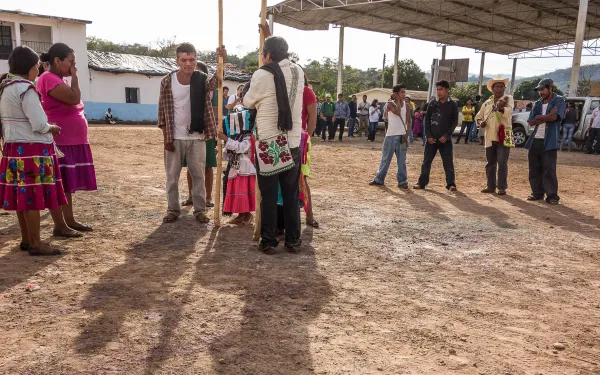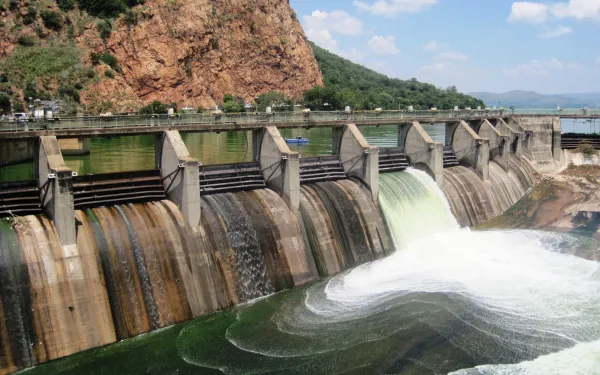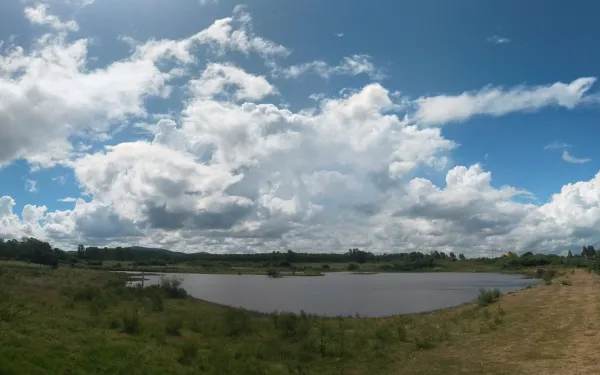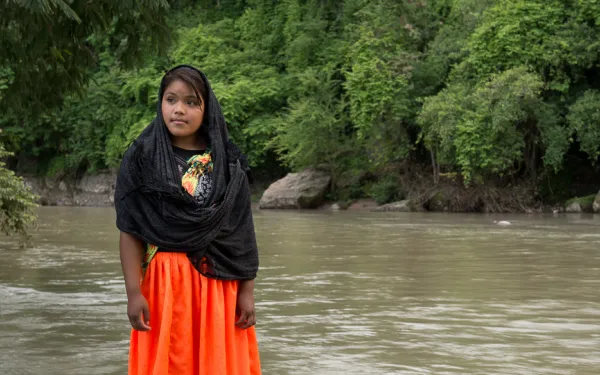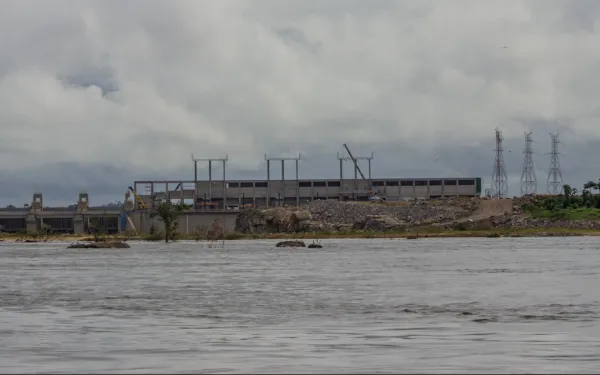Excmo. Sr. Luciano Coutinho
Presidente del Banco Nacional de Desarrollo Económico y Social – BNDES
Río de Janeiro, Brasil
Las organizaciones de la sociedad civil abajo firmantes, comprometidas con la defensa de los derechos humanos, el desarrollo con responsabilidad socioambiental y el fortalecimiento de la democracia, venimos respetuosamente a presentar las siguientes consideraciones y solicitar medidas urgentes ante el desembolso del préstamo anunciado por el BNDES para financiar el Complejo Hidroeléctrico de Belo Monte, en el Estado de Pará.
Considerando que, de conformidad con la amplia documentación y estudios técnicos, existen fuertes evidencias de la inviabilidad económica del Complejo Belo Monte1, con base en factores como: i) el aumento constante de los costos del emprendimiento, que ya se multiplicó en casi 7 veces, de R$ 4.5 billones de reales en 2005 a R$ 19 billones en la época de la licitación en 2010, y actualmente está en aproximadamente R$ 28,9 billones conforme a datos del BNDES, pudiendo llegar a los R$ 32 billones, según analistas; ii) la reducida capacidad de generación de energía a lo largo de un año, aproximadamente apenas un 39% de su capacidad instalada de 11,2 mil MW; y iii) los verdaderos costos económicos asociados a la mitigación y compensación de impactos socioambientales que fueron crónicamente sub-dimensionados, en gran medida, a causa de presiones políticas por la aprobación de licencias ambientales, contrariando informes técnicos del propio IBAMA;
Considerando que el BNDES firmó el 16 de junio de 2011 un primer préstamo puente por un valor de R$ 1,1 billones a favor del Consorcio Norte Energía S.A. (NESA), un segundo préstamo puente el 2 de julio de 2012 por un valor total de R$ 1,8 billones utilizando a la Caja Económica Federal (CEF) y al Banco ABC S.A. como prestamistas; y que el BNDES anunció el 26 de noviembre de 2012 la aprobación de un financiamiento por R$ 22,5 billones (el mayor préstamo de su historia) para Belo Monte, con la actuación del CEF y del BTG Pactual como bancos prestamistas de parte de los recursos,2 para sumar un total de R$ 25,4 billones;
Considerando que los préstamos del BNDES a favor del consorcio Norte Energía están utilizando recursos públicos, oriundos del Programa de Integración Social y del Programa de Formación de Patrimonio del Funcionario Público (PIS-PASEP) y del Fondo de Garantía por Tiempo de Servicio (FGTS), asignados al Fondo de Amparo al Trabajador (FAT) y de la emisión de bonos del Tesoro Nacional en el mercado internacional (en los que la diferencia entre la tasa de interés pagada por Tesoro es aquella cobrada al BNDES y también cubierta por el contribuyente brasileño);
Considerando que para la aprobación de los dos préstamos puente, por un valor total de R$ 2.9 billones, el BNDES exceptuó la realización de análisis de viabilidad económica y de clasificación de riesgo del Complejo Belo Monte, exigidos por la Resolución No. 2.682/99 de Consejo Monetario Nacional – CMN y no cumplió con las determinaciones de la Circular Nº 3547 de 07/07/2011/BACEN (D.O.U. 08/07/2011) en lo relativo a la necesidad de evaluación y cálculo de riesgo resultante de la exposición a los daños socioambientales del emprendimiento;
Considerando que, a pesar de las determinaciones de las Resoluciones 2022/10 y 2025/10, aprobadas por la Dirección Ejecutiva, que instituyó la nueva Política de Responsabilidad Social y Ambiental y la nueva Política Socioambiental del Sistema BNDES, el Banco aún no cuenta con una guía socioambiental con directrices para orientar financiamientos para el sector hidroeléctrico, como herramienta para asegurar el cumplimiento de sus objetivos sociales, económicos y ambientales, en el marco de la legislación vigente;
Considerando que el BNDES recibió notificaciones extra-judiciales firmadas por diversas organizaciones de la sociedad civil en octubre de 2010 y noviembre de 20113, con advertencias sobre los riesgos financieros, legales y de reputación a raíz de su involucramiento como financiador del Complejo Belo Monte; sin que eso haya provocado cambios efectivos en la postura del banco;
Considerando el incumplimiento crónico de las condicionantes de las licencias ambientales (Licencia Previa No. 342/2010 y Licencia de Instalación No. 795/2011), como lo prueban las minutas del seguimiento de IBAMA y de la FUNAI, así como los relatos de organizaciones civiles y poblaciones afectadas, sin que eso haya afectado las decisiones del BNDES en cuanto al financiamiento de Belo Monte;
Considerando las graves violaciones a los derechos humanos de los pueblos indígenas y de otras comunidades locales del Xingú y de la legislación ambiental, así como irregularidades en el cumplimiento de la legislación laboral por parte de NESA y empresas tercerizadas;
Considerando los impactos socioambientales que la construcción de Belo Monte ya está provocando, como por ejemplo el desplazamiento forzado de agricultores familiares y ribereños sin compensación efectiva, afectación a la calidad del agua, mortalidad de peces y quelonios, aumento de la deforestación ilegal, invasión de tierras y explotación maderera ilegal, invasión de empresas mineras depredadoras (como la multinacional canadiense Belo Sun en la Volta Grande del Xingú), aumento de violencia y prostitución infantil, criminalización de defensores de derechos humanos en la región, así como la sobrecarga de los servicios de salud, saneamiento, educación y seguridad pública en áreas urbanas; sin medidas efectivas de solución a los problemas, en el ámbito de las condicionantes de licencias, el PDRS Xingú y las medidas cautelares solicitadas por la Comisión Interamericana de Derechos Humanos (CIDH);
Considerando que el cuadro de ilegalidades de Belo Monte tiene como resultado, hasta el momento, la presentación de 15 acciones del Ministerio Público Federal, 21 acciones de la Defensoría Pública y 18 acciones de organizaciones de la sociedad civil; e internacionalmente la presentación de una petición y el otorgamiento de medidas cautelares por la Comisión Interamericana de Derechos Humanos en favor de las comunidades indígenas de la cuenca del Xingú;
Considerando que el BNDES no posee hasta la fecha un sistema de monitoreo y evaluación del cumplimiento de condicionantes de licencias ambientales, de violaciones de derechos humanos y legislación ambiental y de otros impactos socioambientales de emprendimientos como Belo Monte, contradiciendo así el discurso de responsabilidad social y ambiental del banco;
Considerando que un nuevo aporte de R$ 22,5 billones del BNDES, en el contexto actual de incumplimiento de obligaciones formales por parte de NESA, genera que el BNDES y otros órganos públicos intensifiquen enormemente los problemas de degradación ambiental y el sufrimiento de las poblaciones afectadas y amenazadas en la región afectada por Belo Monte;
Solicitamos que no se realice ningún desembolso del préstamo de R$ 22,5 billones para Norte Energía S.A., anunciado el día 26 de noviembre de 2012 por el BNDES, antes de cumplir con las siguientes medidas urgentes, que constituyen, en su gran mayoría, obligaciones formales preexistentes del Banco:
a) Demostración del pleno cumplimiento de las leyes nacionales e internacionales aplicables para hidroeléctricas y las directrices, criterios y demás compromisos del Protocolo de Intenciones para la Responsabilidad Socioambiental (Protocolo Verde) firmado por el BNDES en agosto de 2008;
b) Esclarecimiento de los motivos para la inexistencia de una guía socioambiental con directrices para orientar inversiones en el sector hidroeléctrico, conforme a lo previsto en las Resoluciones 2022/10 y 2025/10 que instituyeran la nueva Política de Responsabilidad Social y Ambiental y la nueva Política Socioambiental del Sistema BNDES, así como una explicación sobre las medidas que el banco viene tomando y pretende implementar para que tales resoluciones sean cumplidas para el caso de Belo Monte;
c) Criterios y métodos utilizados por el BNDES en el análisis de la viabilidad económica de Belo Monte - especialmente en lo que se refiere a los costos de construcción, producción y venta de energía, y costos de mitigación y compensación de impactos socioambientales – explicando los riesgos de perjuicios para las arcas públicas y el contribuyente brasileño y cómo el banco pretende sanearlos;
d) Demostración de cumplimiento efectivo de la Resolución No. 2.682/99 del Consejo Monetario Nacional – CMN, relativa al análisis de viabilidad económica y de clasificación de riesgo del Complejo Belo Monte;
e) Cumplimiento pleno de las determinaciones de la Circular Nº 3547 de 07/07/2011/BACEN (D.O.U. 08/07/2011) relativa a la necesidad de evaluación y cálculo de riesgo resultante de la exposición a los daños socioambientales del emprendimiento;
f) Muestra de los análisis realizados por el BNDES respecto al grado de cumplimiento de condicionantes de licencias ambientales y sus implicaciones para la aprobación del préstamo principal;
g) Esclarecimiento de los análisis realizados por el BNDES sobre el grado de cumplimiento de la legislación vigente en materia laboral y de derechos humanos, inclusive el derecho al consentimiento libre, previo e informado, conforme al artículo 231 de la Constitución Federal, el Convenio 169 de la OIT y la Declaración de los Derechos de los Pueblos Indígenas de las Naciones Unidas y las medidas cautelares otorgadas por la Comisión Interamericana de Derechos Humanos;
h) Posicionamiento del BNDES sobre las más de 50 acciones interpuestas relativas a las ilegalidades en el licenciamiento e instalación del Complejo Belo Monte, y sus conclusiones en cuanto a las implicaciones del pasivo jurídico del emprendimiento para la aprobación del préstamo principal;
i) Demostración de pleno cumplimiento del artículo 1, § 1º de la Ley 6.938/81, en lo que se refiere a la responsabilidad objetiva de los agentes financieros por los daños ambientales del emprendimiento, inclusive aquellos no previstos o asumidos en la Licencia Previa No. 342/2010.
Señor Presidente, considerando la urgencia y relevancia de este asunto, inclusive para asegurar la coherencia entre los objetivos de responsabilidad social y ambiental del BNDES y sus operaciones en la práctica, solicitamos el máximo de atención y empeño en atender esta solicitud. En este sentido, solicitamos la realización de una reunión urgente de una delegación de las organizaciones signatarias de esta carta con Su Excelencia y su equipo, para tratar las cuestiones aquí planteadas y la implementación de las medidas urgentes propuestas.
Altamira-PA, 4 de diciembre de 2012
See the full list of national and international organizations that signed the letter in the attached PDF version (spanish only).
Read more 